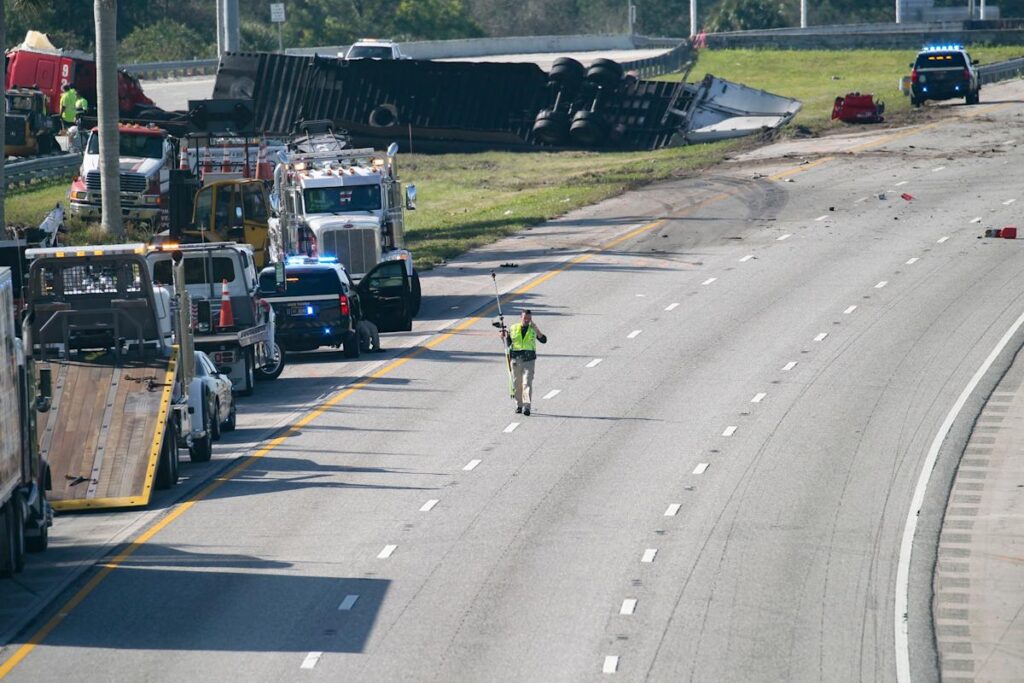In February 2024, 26-year-old Florida Highway Patrol Trooper Zachary Fink died after a crash during a high-speed chase after a reckless driver on Interstate 95 in St. Lucie County.
A bill passed by the Florida Legislature would increase penalties for people who speed or drive recklessly while fleeing or attempting to elude law enforcement. The bill’s sponsor, State Rep. Ryan Chamberlin, R-Ocala, said the bill was inspired by Fink’s death and the increase in high-speed pursuits on Florida roads.
“In the Marion County Sheriff’s Office alone, there have been documented over 1,100 high-speed chases,” Chamberlin said. “That’s almost one every day and a half, just in my district. The numbers really increase across the whole state, and with this bill, we hope to change that.”
What does HB 113, Fleeing or Attempting to Elude a Law Enforcement Officer, do?
The bill does not change the severity of the crimes, but it does change the point value used to determine sentences after conviction.
Fleeing or attempting to elude a law enforcement officer carries different penalties in Florida, depending on the circumstances:
-
If you’ve been ordered to stop and you flee anyway, it’s a third-degree felony, punishable by a fine of up to $5,000 and/or up to 5 years in prison.
-
If you flee at high speeds or drive with a “wanton disregard for the safety of persons or property,” it’s a second-degree felony, punishable by a fine of up to $10,000 and/or up to 15 years in prison.
-
If you flee at high speeds or drive recklessly and injure someone or cause damage to someone’s property, it’s called aggravated fleeing or eluding. That’s also a second-degree felony, punishable by a fine of up to $10,000 and/or up to 15 years in prison.
-
If you flee at high speeds or recklessly and cause serious bodily injury or death to another person, it’s a first-degree felony, punishable by a fine of up to $10,000-$15,000 and/or jail time of up to 30 years or more, depending on the case, with a mandatory minimum sentence of three years in jail.
Each violation is assigned a ranking in the offense severity ranking chart (OSRC) of the state’s Criminal Punishment Code, which establishes a point system to determine sentences. That’s where the “up to” part of fines and imprisonment time is decided.
Under HB 113, fleeing or attempting to elude at high speeds or in a reckless manner bumps up from a Level 4 to a Level 5, which means harsher penalties may be applied.
The bill also adds a sentence multiplier for second or subsequent offenses. If the primary offense is fleeing or attempting to elude, and they’ve done it before, the sentence points will be multiplied by 1.5.
Aggravated fleeing or eluding, in which someone is injured or killed during a chase, moves from Level 5 to Level 6.
Current law requires that the pursuing law enforcement vehicle in these cases must be marked with insignia and jurisdictional markings, with the siren and lights on. The bill removes the requirement for prominent agency insignia.
What happened to Florida Highway Patrol Trooper Zachary Fink?
Florida Highway Patrol Trooper Zachary Fink.
At about 2:40 a.m. on Feb. 2, 2024, a St. Lucie County sheriff’s deputy spotted a white Kia driving twice the speed limit. The deputy pulled the Kia over, but it sped off.
Fink saw the car minutes later traveling at 140 mph west of I-95 and tried to stop it, but the Kia driver, identified as Michael Anthony Addison, made a U-turn on I-95 into oncoming traffic and headed north in the southbound lanes before exiting at St. Lucie West.
The trooper followed, but was critically injured when his patrol car collided with a tractor-trailer. The driver of the semi, 55-year-old Arsenio Mas, was ejected from the truck. Both men died of their injuries.
Addison was arrested after crashing the Kia a short time later. Investigators said the car was linked to “an earlier domestic dispute out of Pompano Beach” when Addison reportedly had been threatening his girlfriend with a gun while driving, records show.
DeSantis ordered flags flown at half-staff in Fink’s honor at St. Lucie government buildings on Feb. 12, 2024.
When does HB 113 take affect?
If signed by Gov. Ron DeSantis or allowed to become law without his signature, the law goes into effect on Oct. 1, 2025.
This article originally appeared on Tallahassee Democrat: Florida police pursuit law ahead: Fines would increase under bill
Read the full article here


